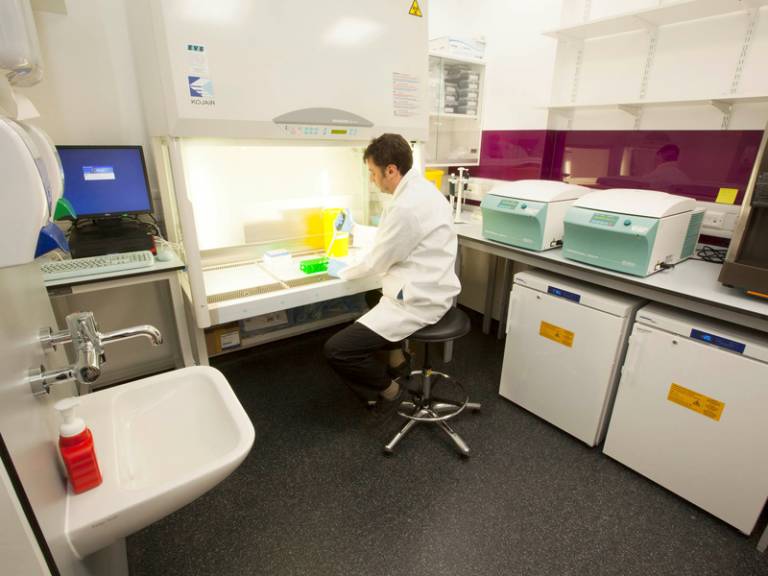Neuroscience research at UCL bolstered by £29m HEFCE grant
10 July 2017
A team led by Professor Michael Hanna, Director of the UCL Institute of Neurology, has won a £28,850,000 infrastructure award from the Higher Education Funding Council for England (HEFCE).

The award will support the improvement of UCL's research facilities, which will enable UCL to deliver on its aim to create the world's leading translational neuroscience environment.
The project will bring together the UCL Institute of Neurology and the UK Dementia Research Institute at UCL, the operational headquarters of the UK DRI which is leading the national dementia research effort. The project will facilitate interdisciplinary research across the university to find better ways to diagnose and treat patients with devastating neurological disorders such as dementia, stroke and epilepsy, that represent a major health and economic burden in the UK and globally.
The funding from the HEFCE-managed UK Research Partnership Investment Fund will provide new integrated spaces for laboratories, drug discovery and experimental neurology, and will drive even closer collaboration with industry, funders and patients.
The project is also benefiting from the generosity of numerous philanthropists. The largest matching contribution came from the partnership UCL has developed with a consortium of retailers who are donating the levy on plastic carrier bags to the UCL Dementia research initiative, namely Iceland, ASDA, HSS Hire, Morrisons, and Waitrose. In addition, UCL has formed partnerships with medical charities and industry partners that include the National Brain Appeal, the Brain Research Trust, Muscular Dystrophy UK, the Epilepsy Society, the MS Society, the Stroke Association, the Wolfson Foundation, Alzheimer's Research UK, the Reta Lila Weston Trust for Medical Research, Eisai Co., Ltd and GSK.
Professor Michael Hanna (UCL Institute of Neurology) said: "This major award significantly advances progress towards our vision to create the world's leading centre for translational neuroscience which will enable us to find treatments, train the next generation and work in close partnerships with industry, funders and patients."
Professor Alan Thompson, Dean of the Faculty of Brain Sciences, said: "I am delighted with this substantial award which is critical for our plans to develop a brand new state of the art facility at UCL to house the headquarters of the UK Dementia Research Institute and the UCL Institute of Neurology. It underlines UCL's commitment to leading the fight to find therapies for dementia and neurological diseases."
Professor David Lomas (UCL Vice-Provost, Health) said: "This is a fantastic boost for our plans to develop the world's leading centre for translational neuroscience and to lead internationally in tackling dementia."
UCL President & Provost, Professor Michael Arthur said: "I am thrilled with this major infrastructure award from HEFCE which recognises the power of UCL Neuroscience. I want to thank all the donors who have supported this important work and made this award possible. This clearly demonstrates the combined power of philanthropy from individuals, trusts and foundations, charities and the corporate sector. Philanthropy founded UCL in 1826 and has helped us ever since to break down traditional barriers of thought to produce new knowledge that transforms lives and society."
About the UK Research Partnership Fund:
UKRPIF is managed by the Higher Education Funding Council for England (HEFCE), in collaboration with the other three UK higher education funding bodies, with proposals assessed by an independent assessment panel.
The scheme supports higher education research in areas of research excellence to attract investment, and to strengthen the contribution of research to the economy.
UKRPIF was first launched with £100 million of public finance in May 2012. In response to the large number of high-quality bids, the Government tripled the public support to £300 million in autumn 2012 and ran a second round of the special funding initiative. In June 2013, the Government announced a further two rounds of UKRPIF, extending it to 2016-17 and making available an additional £200 million to be allocated over two years. An additional £400 million of funding was announced for UKRPIF in the 2015 budget for the period to 2021, taking the total government investment in the fund to £900 million.
 Close
Close

